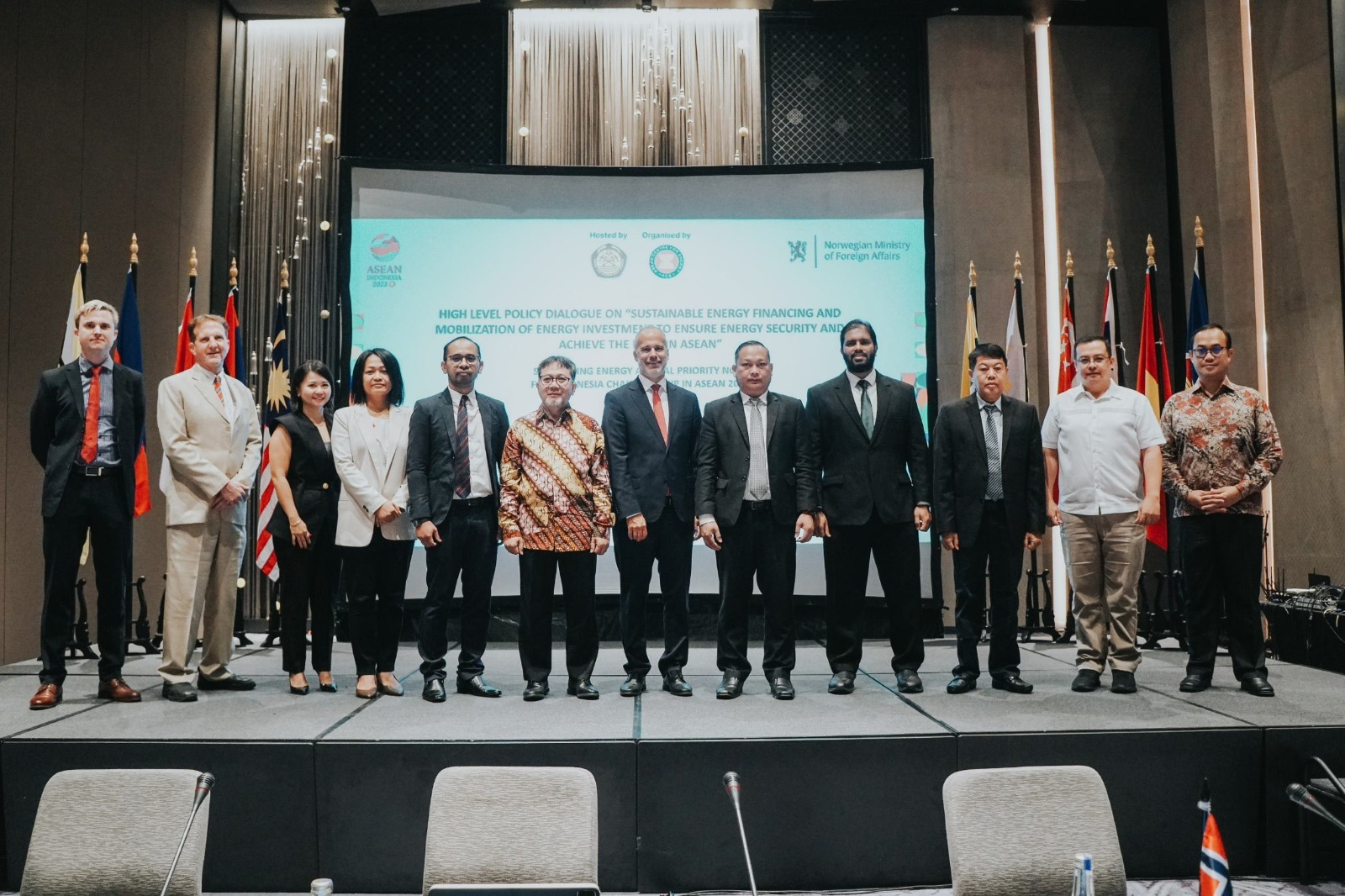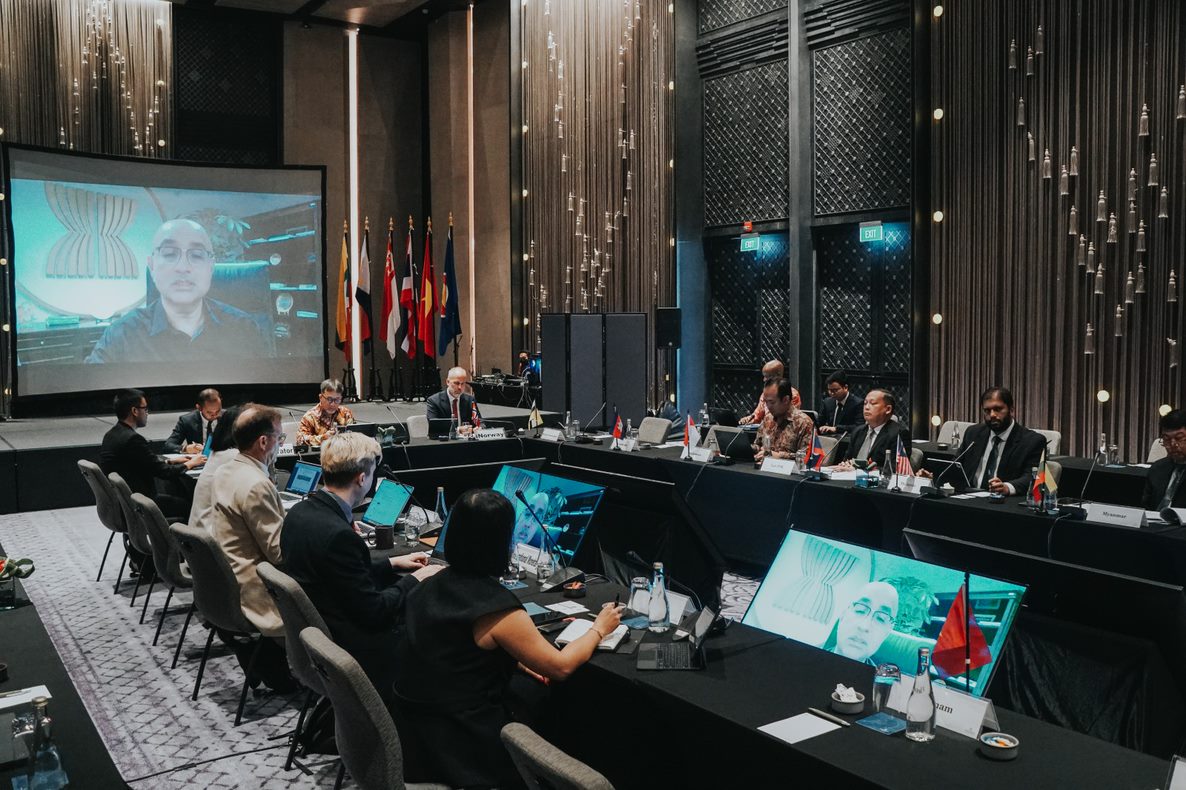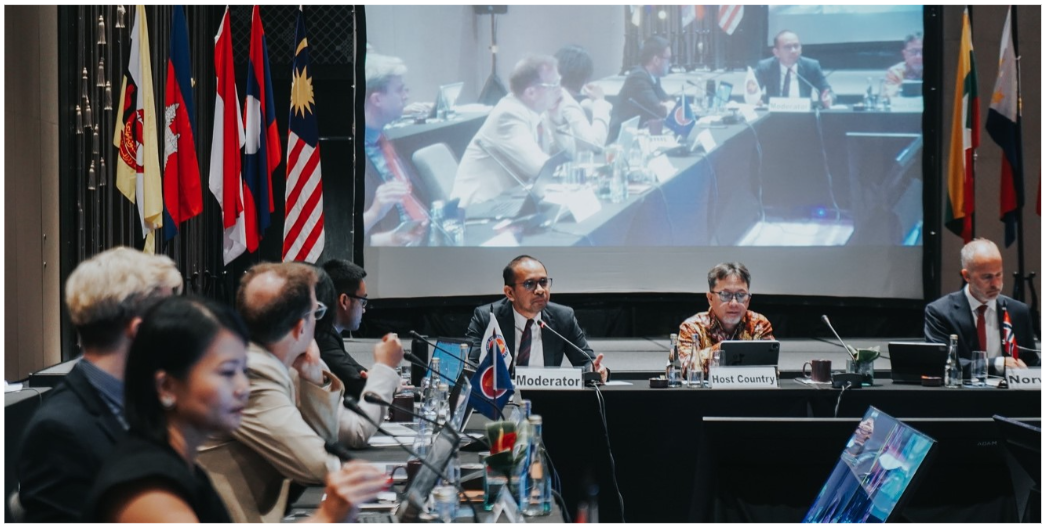i
i
Bali, 24 July 2023

Figure. Participants of the High-Level Policy Dialogue in Bali, 24 July 2023
The ASEAN Centre for Energy (ACE), through the ASEAN Climate Change and Energy Project Phase II (ACCEPT II), recently organised a significant High-Level Policy Dialogue on “Sustainable Energy Financing and Mobilization of Energy Investment to Ensure Energy Security and Achieve the NDCs in ASEAN.” The dialogue, held in support of Annual Energy Priority No. 2 for Indonesia’s Chairmanship in ASEAN 2023, was hosted by the Ministry of Energy and Mineral Resources (MEMR) of Indonesia and supported by the Norwegian Government.
ACE, as a catalyst to unify and strengthen ASEAN energy cooperation, played a significant role in coordinating the dialogue and providing strategic direction. Through ACCEPT II, ACE brought together representatives from ASEAN Member States (AMS), the ASEAN Secretariat and invited panelists from across the region to this High-Level Policy Dialogue, including the International Monetary Fund (IMF), PricewaterhouseCoopers (PwC), and the Asia Clean Energy Partners (ACEP), to address critical challenges and identify innovative solutions for achieving sustainable energy security and meeting climate goals.

H.E. Arifin Tasrif, Minister of Energy and Natural Resources of Indonesia, extended a warm welcome and appreciation for attendees, highlighting the productive collaboration between ACE and MEMR, while acknowledging Norway’s crucial support in advancing sustainable energy development in ASEAN. H.E. Kristian Netland, Chargé d’Affaires of the Royal Norwegian Embassy, reaffirmed Norway’s commitment to addressing energy-climate issues in partnership with ASEAN, particularly through increased clean energy financing efforts such as those in ACCEPT II, aiming to harmonise energy and climate policies. The dialogue’s focus on ASEAN’s energy trilemma, balancing energy security, accessibility, and sustainability, was underscored as essential in navigating the transition to a low-carbon future while ensuring reliable energy supply for the region’s rapid development. H.E. Satvinder Singh, Deputy Secretary-General of ASEAN for ASEAN Economic Community, emphasised the necessity of financial support, including climate funds, to sustain the region’s positive economic growth and address global energy demands through measures like financial subsidies.
During the dialogue, moderated by Mr Beni Suryadi, Manager of ACE & Project Manager of ACCEPT II, ASEAN Member States (AMS) presented their energy transition policies, focusing on higher renewable energy penetration, energy efficiency, low-carbon technologies like hydrogen, ammonia, carbon capture, utilization, and storage (CCUS), and green metals for energy transition. Ir. Wanhar, Director of Electricity Development & Alternate SOE Leader of Indonesia, led the dialogue as the host, underscoring Indonesia’s effective use of Public-Private Partnerships (PPP) to drive infrastructure development. Indonesia’s support through viability gap funding and infrastructure guarantees was discussed, and successful PPP projects like the Coal Fired Power Plant in Batang, Central Java, highlighted risk mitigation, transparency, and processes. Despite facing difficulties in financing due to the assessment of Business-As-Usual (BAU) scenarios and ensuring power supply security, steps are being taken to reduce costs and create job opportunities while enhancing public access to energy. The strategy also includes the involvement of foreign participants to support and accelerate these sustainable initiatives.

Mr Litthanoulok Laspho, Director of Power Generation Planning Division & Alternate SOE Leader of Lao PDR, brought to light Lao PDR’s electricity landscape, primarily driven by hydropower, with ongoing exploration of solar, wind, and biomass integration in its energy transition strategy. While Mr Saiful Adib Abdul Munaff, Senior Director – Operations at the Malaysian Green Technology and Climate Change Corporation, elaborated on the nation’s commitment to achieving a remarkable 70% renewable energy mix by 2050, accompanied by substantial investment and green incentives. H.E. U Than Zaw, Permanent Secretary of Myanmar’s Ministry of Electricity and Energy & SOE Leader of Myanmar, emphasised enhancing gas infrastructure, sustainable energy practices, and multilateral power trading initiatives. Finally, H.E. Felix William B. Fuentebella, Undersecretary for Policy and Planning at the Philippines’ Department of Energy & SOE Leader of the Philippines, outlined a comprehensive energy strategy aiming for a 50% renewable energy mix by 2050, buttressed by competitive financing processes and the establishment of significant energy grids.
Ms Marie Gail de Sagon, Assistant Director, Head of Energy and Minerals Division, ASEAN Secretariat, shared that ASEAN is actively working on its carbon neutrality strategy, which is set to be endorsed this year. The strategy identifies key sectors that could contribute to achieving carbon neutrality, while also focusing on promoting sustainable supply chains. To further support this effort, ASEAN is implementing a circular economy framework, with a particular focus on critical materials for energy and energy efficiency in the transport, industry, and forestry sectors. Financing plays a crucial role in this endeavour, and ASEAN is making noteworthy progress in this area. The ASEAN capital market forum is developing the ASEAN green map, which aims to assess and finance sustainable projects in the region.
During the dialogue, invited panellists highlighted key challenges and opportunities in sustainable energy financing for ASEAN’s energy security and climate goals. Ms Jennifer Tay, Infrastructure Leader of PwC, emphasised the need for a regional grid aligned with supply and demand, while highlighting the significance of bankable tariffs and government-led grid connectivity policies. Mr Peter du Pont, Co-CEO of ACEP, highlighted substantial funding inflows in energy transition initiatives, emphasising the role of financing instruments and the consideration of carbon pricing. Mr Simon John Newport Black, Economist of IMF, discussed the IMF’s engagement in the energy, environment, and climate sectors, including the establishment of the Energy, Environment, and Climate Trust and their focus on carbon pricing initiatives to support sustainable energy objectives.
ASEAN’s commitment to sustainable development was underscored through initiatives like the ASEAN Strategy for Carbon Neutrality, ASEAN Taxonomy for Sustainable Finance, and ASEAN Catalytic Funds, which aim to drive equitable resource access and expedite the region’s transition towards clean energy. The dialogue highlighted the significance of robust public-private partnerships in financing energy projects, underlining the importance of political commitment, supportive policies, accessible finance, clean technology integration, and sustainable supply chains to nurture investments.

The dialogue’s closure featured a remark by Mr Beni Suryadi, who expressed gratitude for contributions from ASEAN Member States and international panellists, acknowledging the dialogue’s success in addressing barriers and unlocking the potential for sustainable energy financing, thereby enhancing regional collaboration. He announced that the dialogue’s outcomes would be presented at the 41st ASEAN Ministers on Energy Meeting (AMEM) in conjunction with the ASEAN Energy Business Forum (AEBF) 2023 on 24-25 August 2023 in Bali, Indonesia, further deepening regional cooperation in sustainable energy financing. Ultimately, the dialogue underscored ASEAN’s resolute commitment to a sustainable, low-carbon future, facilitated through collective efforts, innovative financing models, and strategic policy dialogues that contribute to achieving energy security, combating climate change, and advancing global sustainable development objectives.
Further details about ACCEPT II can be found at https://accept.aseanenergy.org/.
We welcome any future collaboration, please feel free to contact us at [email protected]